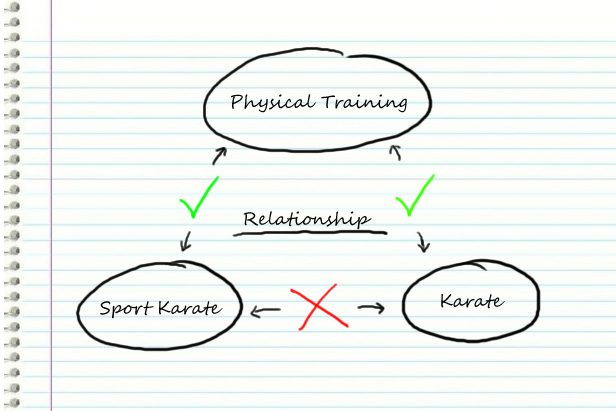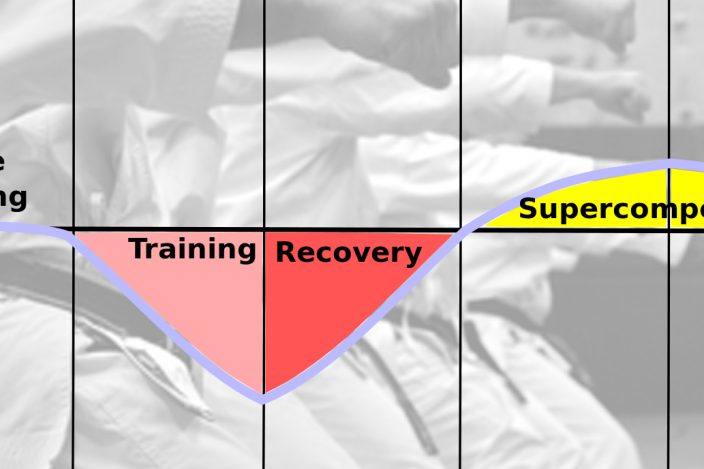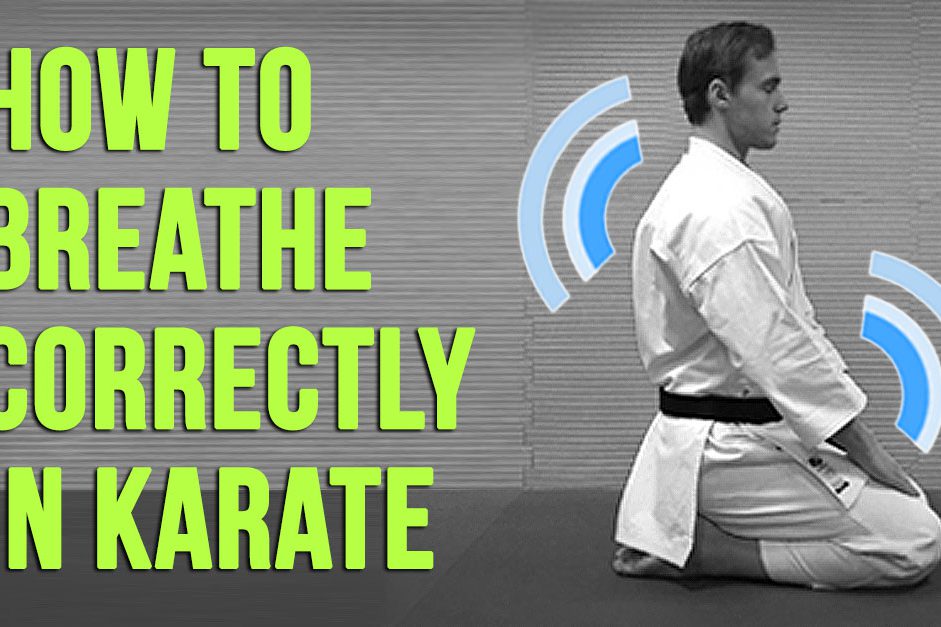This is the third installment in a series of posts recounting my super exclusive interview with the Venezuelan superstar Antonio Diaz, World Champion of kata (WKF) in Serbia 2010.
Let’s jump straight in from where we left off in part 2!
J: Speaking of motivation; don’t you use any music, for motivation and inspiration?
D: “Yeah, yeah, I like, I like. Music. I started using it before every competition, because sometimes I’m very disperse. You know, I hear something over there, or I see something over there…”
J: …and everybody wants you autograph…
D: “…yeah! Things like that. So for competition I started listening to some music. To make me focus a little bit. I like it. It motivates me, but also isolates me from all the things that are happening around.”
J: What kind of music? Venezuelan folk music?
D: “No, no… more like… any kind of music. I like rap music. Or maybe R&B. Depending on the feeling. Maybe, sometimes Eminem, or something like that.”
J: Cool! Besides music, do you use any other mental techniques or tools for training? Becoming a World Champion must surely involve a lot of mental toughness and visualization?
D: “I visualize a lot, yeah. And I remember just now, that when I was younger and started watching these videos from the World Championships, I used to stand home in front of the mirror and imagine I was competing, like “Okay, I’m doing this kata for the first round” and then I’d imagine “Okay I passed first round, now I’m doing this kata for the second round…”. Sure, now it’s easy because you have all these videos on YouTube and everyone can watch, but when I was younger it was difficult to find a video from the World Championships. It was almost like a treasure, you know?!”
J: Do you still do that?
D: “I try to do visualization now, but at that time it was more innocent. More like a fun game. Like a kid’s game. Now I try to use that feeling but focus more. I try to imagine the place for the competition, or if I arrive at the venue a few days before the competition I try to imagine the space, and the competition. I think that’s very important.”
J: Interesting. Speaking of competition, can you quickly go through your chosen competition kata? Which are they, and why did you choose them?
D: “Well, now I have the shitei [WKF’s mandatory first/second round kata], Bassai Dai and Seienchin. Because that’s the Shito-ryu kata. Before, when there was no flag system, I used to do Seipai. So at first I did the shitei Seipai, but then I thought I should skip it and stay all Shito-ryu. So I stay with those two shitei kata. Then I have Suparimpei, which I have always liked…”
J: … and that’s your favorite kata, right?
D: “Yeah. Also Chatan Yara Kusanku I try to like – it’s a painful relationship. But Suparimpei, Seipai and Kururunfa; I learned those kata in that time when I was in “the middle”. When I was out from Shitokai and did Ryuei-ryu.”
J: Your Suparimpei is from Ryuei-ryu? But it looks like a mix between Goju and Shito?
D: “Yeah, yeah. It’s because of competition. Maybe this part is too slow [demonstrates Suparimpei’s haishu-uke, nukite combo] for referee, so I do it fast.”
J: So it’s just your preference?
D: “Yeah, just small touches. But the directions are like Goju-ryu. Then I have Anan. The Anan I also learned as the Ryuei-ryu version. Then I have Nipaipo. And Chatan Yara [Kusanku].”
J: I thought you did Paiku too?
D: “Paiku? Yeah, because when I started competing in the Golden League there were many people, sometimes seven rounds, something like that. And no shitei rounds! So I said “Okay, I need to incorporate two more kata”, so I did Paiku and Kururunfa. And one time I also did Unsu, I like…”
J: …UNSU?!
D: “Yeah, Shito-ryu version. Sometimes it’s fun, for example when I have a national tournament, to try new katas you know? That’s fun for me. Like, one time I tried Kosokun Dai. But I only do this in a round that I know is not so hard. This time, in the national championship, I did Kosokun Sho.”
J: Nice! I bet many people would want to see that!
D: “I like to try that sometimes, you know. And maybe, if it feels good, I might start working on it for higher level competition! But right now I’m fixed with Nipaipo, Chatan Yara, Anan and Suparimpei. Kururunfa almost too, but this time I went with Nipaipo… at the World Championships.”
J: Since we’re at the subject of high level competition, let’s turn our attention to your most famous rival – Luca Valdesi.
D: “Yes.”
J: At the last World Championships (2010) in Serbia, when you won over him in the final, you did Suparimpei for the gold. But in the World Championships before that (2008) in Tokyo you did Chatan Yara Kusanku. However, you lost that time. So, my question is: Do you think you won last year (2010) because you changed kata… or because you had actually become better?
D: “In 2008 I changed a lot, since I started training with Inoue sensei. But when I went to the World Championships in Tokyo, my strategy was to do Suparimpei in the semi final, since I had seen the draw and thought I was going to meet Japan there. But then Japan lost first round! Against France! So I thought “Should I change strategy?”. But I said no, and kept it. Maybe I should have changed, but I don’t regret it. When you take a decision it is taken. Many people said “Oh, you should have done Suparimpei in the final!” then, but I tried my best.”
J: So you mean Suparimpei is actually your best kata?
D: “Yeah, it is, but I tried my best. I also really like Chatan Yara, and I thought I could do a good Chatan Yara. And it was not that bad, 3-2, not much difference. So I said to myself that next time I was going to use Suparimpei. So I changed. But I don’t see it like a mistake, it was just a strategy. Good experience. Also, we [Diaz and Valdesi] have been competing against each other a lot. The other day I was actually counting, and we have competed 17 times.”
J: You’ve met Valdesi 17 times?!
D: “Yeah. 10 times he won, 7 times I won.”
J: So you have only 3 left before he retires!
D: “Yes [laughs]! I have to beat him 3 more times!”
J: I just have to ask: Did Valdesi perhaps inspire you to train harder, at any point? Did you think “Man, I have to beat him!”, so you started training even harder?
D: “Of course, you know, I think he’s really great. I can say some things, but I think he’s a really good athlete. He’s really, really good. He’s very fast and very explosive. I think he’s the top level, when it comes to competition. But also, I think it’s a mistake to focus only on one person. Because maybe somebody else can go up in level. But it’s good for the feeling of “Now I have to work hard”, you know? Also, when I think about Luca, for me it’s hard to be stronger than him. It’s not my goal. I think I need to focus on other things, like technique and speed. I try to do different things that can differentiate me from him.
J: So obviously you are a big inspiration and role model for many people. But who inspired you?
D: “When I started watching these competition videos… I remember the first World Championship I ever saw was the -92 Granada, Spain. At that time Sanz [the competitor from Spain] won, and it was the first time a Japanese hadn’t won the World Championships [Ryoki Abe of Japan placed second]. So that was an inspirational moment. And then I watched Milon, and I was very impressed. He really had the feeling, he was very into it, you know. I wanted to get there. Then I started watching some videos of Sakumoto, watching more World Championships, thinking “I really want to be there!”. So I think watching the old World Championships was what really helped me and motivated me. I could picture me being there. I knew that one day I was going to be there in reality, and not just in the movie.”
J: Like you mentioned before, you regularly travel to Japan. So do many other Karate enthusiasts too, including me, in search for some alleged “secrets” of Karate. So my next question is: Do the Japanese masters know things we don’t? Do they have knowledge we don’t have? Or is it possible to become the greatest without ever setting foot in the “land without chairs”?
D: “[laughs] I think… I don’t see it like “secrets”. But I think for kata – yes, you need to be there. Maybe kumite is different, because of the changes, you know, Europeans are dominating because they studied the Japanese traditional linear way of kumite and adapted, changed. It’s more tactics. But for kata…”
J:… because I mean, the Japanese aren’t really winning any more, right? Maybe the West is catching up, and learning other stuff?
D: “Yeah, but also, I think it’s good for the essence. To know about the roots. For me it was a big experience at least. You know, maybe you learn a kata in your country, maybe even from a good teacher, but when you go to Japan you are closer to the person who invented the kata. I remember learning Nipaipo, and trying to imitate [Mie] Nakayama, you know? In Japan you are closer to the real information. The grade of separation from the origins of the kata is lesser. I think you can take a lot from that. When I train Nipaipo with Inoue-sensei, for example, he really explains every movement, and why it is like this or that. But I mean, it’s not impossible, of course, you don’t have to go to Japan. Valdesi is 3 times World Champion and maybe never trained the “Japanese” way. For me it worked to go to Japan. Ever since I started working more deeply in 2008 in Japan, I have improved.”
Only 10 minutes left of the interview…
Get ready for some real gems in part 4!



4 Comments